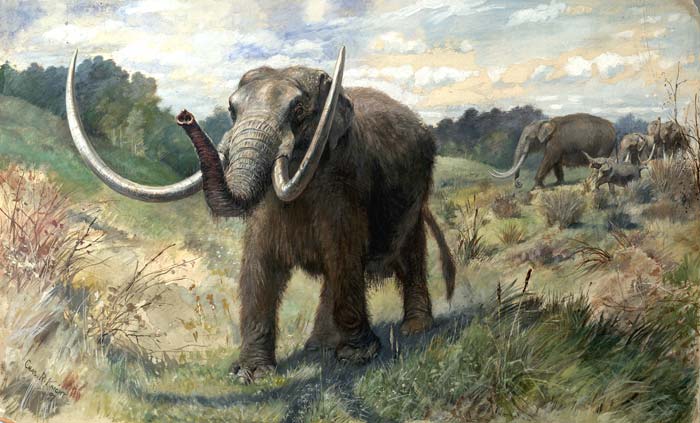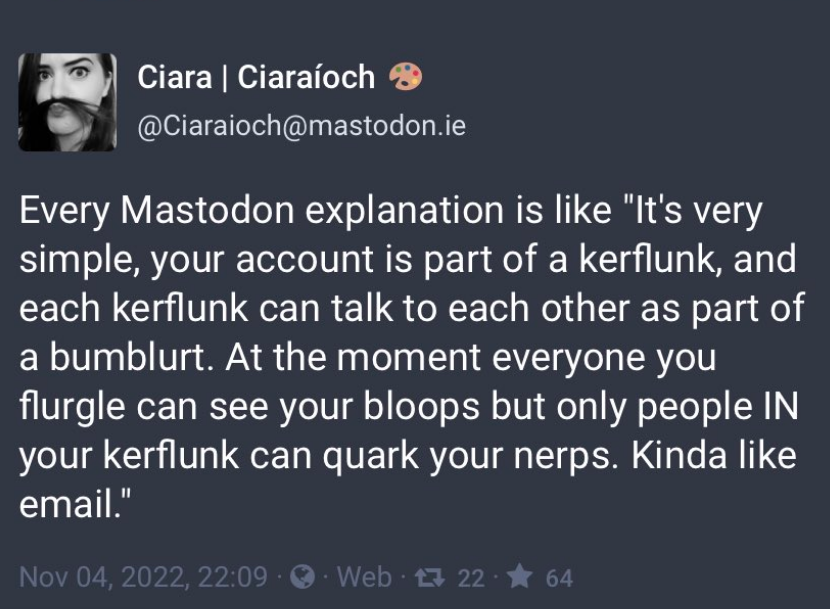
November 11, 2022, by Brigitte Nerlich
‘It’s not a retoot is it?’ Moving between platforms and languages
The question in the title was asked by Aris Katzourakis on Mastodon, the now well-known decentralized social network built on open web standards by a non-profit. In this little post I’ll tell the story of how I came to explore a new social world, including a new language.
***
I joined Twitter about a decade ago and loved the way it enabled me to connect with people all over the world interested in science, art, photography, polar explorations, shepherding, climate change, politics (especially satire), you name it. There was, of course, also another, less joyful, side to Twitter, but with a little bit of tweaking I could blend that out. Now a billionaire has bought Twitter and it is being reconfigured in ways that made people like me think: do I stay or do I go? At the moment I am doing both. I am staying on Twitter, mainly for the politics and I have moved to Mastodon, mainly for the science and friendliness (so far).
Adopting
Several years ago, Victor Venema, a climate scientist over in Germany working at my old my alma mater, the University of Bonn, had talked about Mastodon on Twitter. He said that he had moved ‘over there’ to escape some of the toxic aspects of Twitter.
I thought at the time that this was interesting but soon forgot about it – until the end of October 2022 when I thought that it would be best to get at least a foothold in an alternative to Twitter and Mastodon arrived or rather stampeded on the horizon. What helped make up my mind was reading something Ruth Mottram, a glaciologist and friend of Victor’s, tweeted on 27 October, on the day that Elon Musk bought Twitter: “I posted this one on @joinmastodon: and used crossposter to automatically send it here. You can join us on the #Science #fediverse if you want: fediscience.org/web/home” I followed her example, created an account and joined Mastodon on 28 October. I was quite on trend for once, even a bit ahead!
Learning
However, like many others, I found things quite baffling at the beginning and very much sympathised with this message that somebody reposted on Twitter:
It was a weird feeling trying to get going on Mastodon. I knew that I would struggle with the technology, as I am a complete technophobe, but I hadn’t expected to struggle with the language. I didn’t know what ‘severs’ were (they were not what ‘servers’ were over in my universe) or what instances were (they were certainly not the same as what I thought ‘instances’ were). It turns out that they are quite interchangeable and just mean the sub-node in the social network to which you attach yourself.
There are also more amusing aspects of the new language spoken at Mastodon (as parodied above). Tweets are called ‘toots’ and, like Aris Kastourakis, I thought retweeting would then be ‘retooting’. But, fortunately, it’s called ‘boosting’, which I thought was quite a nice term. Everybody likes to get a boost once in a while. And… we should not forget that we, at least initially, laughed at words like ‘tweet’ and ‘Twitter’ too!
A day after I wrote the above paragraph, I read another toot by Aris and I found out that ‘boosting’ is also called ‘reblogging’ and it’s all a bit more complicated. Boosting or reblogging ensures “that people not on the instance that the toot was made, get to see it”. Boosting a toot allows “your followers to see the toot in their timeline as well as the toot being boosted on the local instance & the federated.” And that brings me to ‘likes’. If you press the little star underneath a toot, it lets the author know that you like (‘favourite’) what they say, but this does not feed the algorithm.
Anyway, there are now, as David Griffith calls it, lots of ‘tootorials’ on the site and elsewhere (you’ll find a whole string of them posted after Stephen Fry asked for guidance about Mastodon, here) (and here is important stuff on security and privacy). In general, trial and error and asking stupid questions worked well for me and I soon became a semi-literate ‘Mastoid’ or ‘Mastodonian’ or whatever Mastodon users are called.
Adapting
Once I had overcome the techno- and language barriers and joined the server/instance fediscience I got a friendly message from Victor Venema, telling me “Welcome to the Fediverse. It is a bit harder to find interesting people on Mastodon than on other networks. It has thus become a tradition to write a post with the hashtag introduction (and also otherwise many hashtags) to make it easier for people to find you. Also a good bio helps a lot, especially in the beginning. Hope you like it here. Always happy to answer any questions.” So I posted a quick intro, fleshed out my profile with a bio etc.
After that, things got quite easy and I became fascinated by the introductions people were posting. Most astonishing of all, I found old linguistics friends I had totally forgotten about, some of whom remembered things about me, like a 1993 summer school, that I myself had totally forgotten about!
I discovered that there are groups and lists that you can join or explore on any topic you like, such as philosophy, sociology, psychology, history ( #histodons!) and also linguistics. For example, as an ex-linguist I was glad to hear somebody saying, in a way that made me smile: “I’m a group about linguistics. Follow me to get all the group posts. Tag me to share with the group.” Anyway, I soon also found lots of old friends from over on the other side who gradually trickled into this one, from every field of science, the arts, literature and so on.
Now big names like Stephen Fry and Larry the Cat have joined, as well as big scientific journals like Science and Nature, as well lots of newspapers and loads of European institutions, including government ones. I will be interesting to see how this platform grows and changes.
A couple of years ago, Victor Venema t… I almost said tweeted, but it’s of course ‘tooted’: “Together with Frank Sonntag I have created a new Mastodon instance: FediScience, a friendly place where scientists can let their hair down.” I am in that place now and I hope it remains a friendly place where scientists and others can let their hair down.
Alerting
One thing is important: ‘we’ shouldn’t let it become a Twitter clone. As Vladimir Bogoeski said: “Mastodon users who have been using the platform for many years now keep raising a good point that us new users should take seriously. While we are all searching for a replacement for Twitter, it makes sense to embrace Mastodon as a different type of website/forum and explore how to use it on its own terms. Or in other words: trying to replicate Twitter here would be a bad idea.”
In order to avoid that, it’s also important to listen to critical voices, like this one or this one over on Twitter! And, most importantly, we should all try to be nice to people, especially those who have used Mastodon for a long time and might feel a bit overwhelmed by all the newcomers crashing and tooting about the place.
Image: Mastodon, Wikimedia
No comments yet, fill out a comment to be the first

Leave a Reply